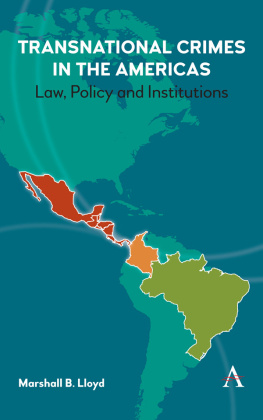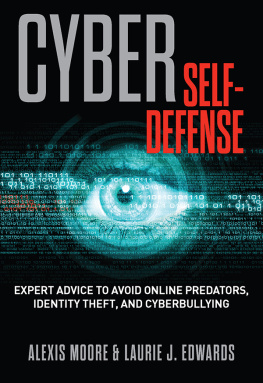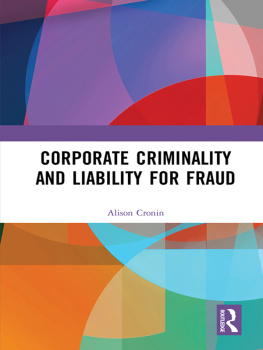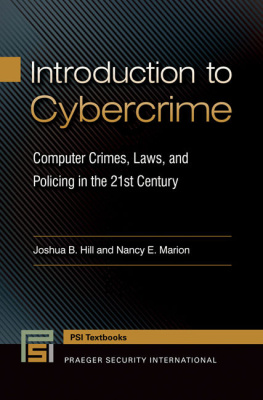The Criminal
Mind in the Age of
Globalization
The Criminal
Mind in the Age of
Globalization
By
SARON MESSEMBE OBIA
Vij Books India Pvt Ltd
New Delhi (India)
Published by
Vij Books India Pvt Ltd
(Publishers, Distributors & Importers)
2/19, Ansari Road
Delhi 110 002
Phones: 91-11-43596460, 91-11-47340674
Mob: 98110 94883
E-mail:
Web : www.vijbooks.in
Copyright 2021, Author
ISBN: 978-81-94697-40-4 (Hardback)
ISBN: 978-81-94697-41-1 (Paperback)
ISBN: 978-81-94697-42-8 (ebook)
All rights reserved.
No part of this book may be reproduced, stored in a retrieval system, transmitted or utilized in any form or by any means, electronic, mechanical, photocopying, recording or otherwise, without the prior permission of the copyright owner. Application for such permission should be addressed to the publisher.
The views expressed in this book are of the contributors/authors in their personal capacity.
Dedicated to
To almighty God and Mr. Sammy Sammy Obia
I would like to acknowledge Dr. Dan Ekongwe, Regional Director of the Pan African Institute for Development, West Africa-Buea and Dr. Celestina Fru Tassang for their invaluable guidance in my academic research. As a researcher in criminology trained in Cameroon and product of an international and diplomatic institution, the Pan African Institute for Development, West Africa (PAID-WA). I am very fortunate to have spent the past one and half years on a different trajectory in the field of security studies. As a result, I feel confident to approach security issues from all dimensions.
I would also like to express my sincere appreciation to Noor Dahri, Founder and Executive Director of the Islamic Theology of Counter Terrorism (ITCT), United Kingdom, who has been of assistance, to Colonel (Rtr) Youssa Gedeon (PhD), Major (Rtr) Dieudonne Bilec, Commissaire Principale (Rtr) Siewe Levir, Mr Martin Hale, CEO IT Masters, Adjunct Senoir Lecturer at Charles Sturt University (CSU) for the knowledge acquired through his educational platform, Sir Andrin Raj (PhD), Director of the International Association for Counter Terrorism and Security Professional South East Asia (IACSP SEA), Tammy Waitt, Editorial Director of American Security Today, and also to Mr. Tchouksonou Jean Marie. I am grateful to Madam Tchouksonou Pamela Bessong, National Pedagogic Inspector for Bilingualism in Cameroon, for her linguistic expertise.
I am deeply honored to have received positive and encouraging feedback from Philomena OGrady, Forensic Criminologist, whose insight was impactful, Rev. Ngalle Simon, Mr. Pendie Kelvin N., Mr. Wilson Mengole, Mr. Prospere Baihoul, Mr. Abraham K. Mendy, Mr. Fandjio Mougang B. and from Hon. Elizabeth Mokake, whose advice led me into the field of international security. I am also indebted to the legendary Prof. Bishop Jatau Emmanuel of Faith Hills Prophetic Assembly, Abuja/Nigeria for both his professional advice and his personal kindness.
This work provides insight to criminal investigators and the criminal justice system on the necessity for collaboration with financial institutions, security expert and mobile service providers on how to crack down cybercriminals. provides an insight of cybercrime, identity theft and identity fraud. It explores the various types of crimes, the sociology of crimes in Africa, modus operandi, practical illustrations with the triangular theory of crimes and the constructive theory. The challenges of criminal investigations are enormous, pertinent case studies are explained following new trends. It further elaborates on best practices for developing countries in the field of cyber security.
Information is money but intelligence breach equates war. Social networking sites are increasing used for socio-political probes in the world. explores deviant attitudes on the cyber space. First it draws in to the concept of social media and deviant behavior on the internet, focusing on emerging threats and the cyber election interference in the United States of America. The menace posed by social media in developing countries and particularly in former French colonies. Cameroon is a critical case at hand, where the press has a double identity; that is as an element of construct and destabilization. It also examines cyber deviance in the music industry with case of Nigeria and Cameroon, as well as sexual deviance in University milieu, cyberbullying on social media. The chapter through a theoretical in-depth explores the neutralization theory and sanctions impose by social networking sites with Facebook as case study.
In the field of security studies, one plus one does not equate two. Despite the evolution of information technology, biometric examines the ideology of criminal investigators using biometric system and digital forensics to track cybercriminals. Biometric classification and organization pattern are being explored, as well as strategies use by some states. The chapter points out the different trends for criminal crack down. Also, the 5 stages of cybercrime and three stage model of cyber criminality are being exploited for a proper theoretical framework. The chapter provides emerging crimes and challenges for proper security measures to establish through exchange of security intelligence amongst regional and international agencies in the fight against non-conventional crimes.
illustrates how profit demurs the prime reasons for mobile operating companies, security measures neglected and staff dishonesty in financial institutions. The inadequate expertise in relation to cyber security and lack of understanding of criminal patterns is another dilemma. The chapter describes a prostitute as one of the major partners of cybercriminals during the commission of crimes. From the cyber insecurity scenery, the role of prostitutes is examined, hacking of accounts and skimming as well as, contemporary crimes as mobile money account breach. It further examines illicit drug consumption, offensive content and harassment even in university milieus.
The 9/11 attacks gave a different narrative about international security; lack of collaboration amongst security agencies. There are several security challenges that exist, such as; global intelligence organizations, civil aviation organizations and the international criminal police.
The internet is a global tool for the transfer of information by individuals, organizations and governments. Technological advancements in terms of the cyberspace in Africa, has produced shifts in the ability to reproduce, distribute, control and publish information, the internet in particular has changed the economics of production and reproduction (Longe and Chiemeke, 2008).
. Such actions will facilitate control, management, examination and evaluation of cybercrimes and particularly the means to track perpetrators of these crimes.
Since the lack of expertise (technological and educational expertise) is invariably attached to the lack of evidence during proceedings in the Criminal Justice System. The lack of evidence is a major challenge to track and render justice against cybercrimes due to the complexity of the crime. Cyber criminals mutate their strategies to hide the pattern of cybercrime from policing and the Criminal Justice System. For example, a pedophile who baits his victim through email or social networks. This delays the decision-making process thereby delaying the punishment and this can also lead to wrong decisions encouraging other criminals to be casual and fearless. Furthermore, the hacking of the Cameroon presidential website in 2015, makes such reinforcement and search for effective expertise as well as the development of a criminal database and an upgraded version of the internet an urgent proposition.







